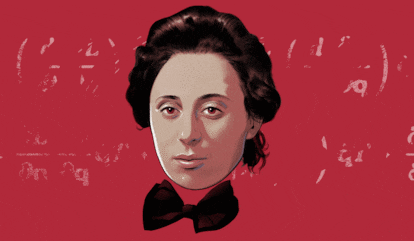Emmy Noether, the renowned mathematician who taught 20 years of unpaid classes just because she was a woman
Only her personal fight against the prevailing norm of her time allowed her to be a pioneer in fields such as algebra or physics

There is no serious study that has found a gender bias regarding our brain’s capacity for mathematics. If for many years the world of mathematics resembled an all-male diocesan seminary in the post-war period, it was not due to any biological cause, but rather because society prevented women’s access to careers in science. A good example of this is the case of mathematician Emmy Noether.
Amalie Emmy Noether was the daughter of a German Jewish merchant family. Her father had taught himself mathematics while working in the family business, earning a doctorate in Heidelberg and obtaining a position as a university professor in the city of Erlangen. Her brother Fritz Noether was a renowned applied mathematician, and her older brother, Alfred, earned a doctorate in chemistry, although he died at an early age.
When she was young, Emmy did not show the same inclination for science as almost her entire family, becoming more interested in languages and music. In 1903, a change in German law allowed women access to university studies. Emmy attended the University of Göttingen as a student and found her calling listening to the classes of the astronomer Karl Schwarzschild (the one who had postulated the existence of black holes based on Einstein’s equations) or the great mathematicians David Hilbert and Hermann Minkowski. In 1907, she obtained her doctorate under the direction of Paul Gordan, although she was not very satisfied with her work at that time, and years later she described her thesis as rubbish.
She was the second woman to obtain a doctorate in mathematics in Germany, where women were allowed access to university studies, but not to the teaching faculty. Emmy Noether began researching and teaching at the University of Erlangen, occasionally substituting for her father, but without being able to receive any type of payment for her work. However, her ability for mathematics was beginning to be known and valued. Two of her professors in Göttingen tried to offer her a teaching position at their university, but, again, she was denied access to the teaching staff due to her being a woman. She continued researching in Göttingen, but without being able to earn a salary, and had to support herself. She could also only teach unannounced classes, when David Hilbert required a replacement. Despite these precarious conditions, Noether made her greatest contribution to science during her time in Göttingen: Noether’s theorem, which establishes that any conservation law in physics comes from a symmetry. It may seem simple, but it is one of the bases of modern theoretical physics, and many authors compare its importance to that of the Pythagorean theorem for geometry.
In 1919, after the November Revolution, she was allowed to take the qualification exam to become a university teacher, which she successfully passed. Three years later she obtained special permission to be a professor at the University of Göttingen, but without pay. The following year, she was finally promoted to professor of algebra and received official remuneration, after almost 20 years of career at the expense of her own resources and when she was already considered one of the most important German mathematicians. At this time she made important contributions to the field of algebra that are still studied in the textbooks.
In the 1930s she received recognition and awards for her work as a mathematician. In 1933, the rise of the Nazis caused her to be expelled from the university for being Jewish. For a time she continued teaching at home. She eventually emigrated to the United States, where he found a position at Bryn Mawr Women’s College in Pennsylvania and was able to resume her scientific career, but only for a short time. Two years later she died as a result of complications arising from an operation to remove an ovarian cyst. She was 53 years old. It was a short life, but enough to develop some of the most beautiful theorems in mathematics.
J. M. Mulet is a professor of biotechnology.
Emmy's was not the only premature end in her family
Her brother Fritz was also purged by the racial laws of the Third Reich from his position as a university professor. With leftist ideas, he emigrated to the Soviet Union, where he obtained a position at Tomsk State University. In 1937, during the great Stalinist purge, he was convicted of espionage and sabotage, and later sentenced to death, accused of making anti-Soviet propaganda. He was shot on September 10, 1941, in the Medvedev Forest Massacre. His body was never located. In 1988, the Supreme Court of the Soviet Union ruled that his conviction was unfounded and he was rehabilitated. A little late…
Sign up for our weekly newsletter to get more English-language news coverage from EL PAÍS USA Edition









































